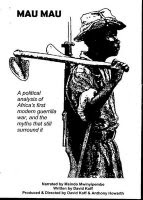"The man offers a breath of fresh air that the world needs. Clinton just wants business as usual. He offers a new approach to the Middle East crises, to Iraq, for Africa. Things cannot continue the way they are - we need someone who will do business un - usual."
It appears to me that somewhere down the line, this struggle for Peace, Truth and Justice has been put on the backbench with the 40 odd sleeping MPs. I desperately search the wires for signs that all those lives lost and thousands displaced has amounted to something more than a false sense of restored hope. Is it over? Are we to just get on with our lives and keep receiving our handsome paychecks for representing truth and justice?
This clever little man went on to explain that one of the biggest problems in Kenya is that we are too democratic. "We are so democratic in this country that we are not able to actually achieve anything because we are too busy holding consultative forums. Talk, talk, talk. Consult, consult, consult. Of course it is a good thing to hear peopl's opinions but that's all we ever do. Do you know why we can't get complete the Constitutional Review process? Because everyone has to be consulted about whether to put a full stop or semi-colon! Do you know how many hospitals and schools could have been built for the amount of money that these consultative workshops have cost us?"
If I may take the liberty to add: do you know what the true cost of a democratic free and fair elections has cost Kenya? To all those who cast a vote - REMEMBER THIS?
 What of all the campaigns that we started? What is to become of them? For example, the petition to demand MP salaries are reduced and land returned has collected a mere 159 signatures most of which are from overseas (or are there several other petitions out there that I am not aware of). I bring that up because that is the smallest of examples I can think of. Can someone please assure me that there are groups out there that are still fighting for justice? That the people responsible for what happened will be held accountable; that the ECK will be served dinner behind bars; that this coalition that is draining our country's bank accounts is not acceptable. Can someone please tell me if there is anything I can actually do for my country?
What of all the campaigns that we started? What is to become of them? For example, the petition to demand MP salaries are reduced and land returned has collected a mere 159 signatures most of which are from overseas (or are there several other petitions out there that I am not aware of). I bring that up because that is the smallest of examples I can think of. Can someone please assure me that there are groups out there that are still fighting for justice? That the people responsible for what happened will be held accountable; that the ECK will be served dinner behind bars; that this coalition that is draining our country's bank accounts is not acceptable. Can someone please tell me if there is anything I can actually do for my country?










